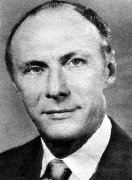 Marcus Bach was an American writer and lecturer on religion, and founder and director of “The Fellowship for Spiritual Understanding.” At one point in his life, Dr. Bach set out to meet the five people of his time whom he felt best exemplified the teachings of Jesus Christ in their lives. He travelled 40,000 miles in pursuit of this aim, interviewing Helen Keller, Pope Pius XII, Albert Schweitzer,Therese Neumann, and Shoghi Effendi.
Marcus Bach was an American writer and lecturer on religion, and founder and director of “The Fellowship for Spiritual Understanding.” At one point in his life, Dr. Bach set out to meet the five people of his time whom he felt best exemplified the teachings of Jesus Christ in their lives. He travelled 40,000 miles in pursuit of this aim, interviewing Helen Keller, Pope Pius XII, Albert Schweitzer,Therese Neumann, and Shoghi Effendi.
“I went to Israel recently, to the harbor city of Akka, for it was there that Baha’u’llah, banished from Baghdad, spent his years of exile. To this windswept land, where Francis of Assisi once walked, Baha’u’llah came in chains in 1865. I went to the old prison where he was held captive for 25 years and where his son, Abdul-Baha, was a prisoner for 40 years. As I poked around behind the old walls and peered into the dungeons, the Baha’i story came to life. Baha’u’llah, like Jesus, had a forerunner who called himself the Bab, which means “the Gate.” In the midst of the religious and political wrangling of Moslem, Christian and Jew, the Bab said in effect: “A plague on all your houses. You have all lost sight of your common origin.” He preached that God is the Father of all men and the Founder of all faiths, and that the time had come when heaven would personify this truth. Like John the Baptist, the Bab announced the coming of a messiah: Baha’u’llah, who proclaimed himself in 1863.
I went to Bahji, some six kilometers inland. Here is the sheik’s mansion where Baha’u’llah lived like a prince after his release from prison and where he died in 1892. Here is the holy spot where Christians, Jews, Moslems, Zoroastrians and Buddhists came to “lament the loss and magnify the greatness of the herald of God.” Baha’is even today do not speak of the death of Baha’u’llah but, rather, of his ascension. In reverence, I knelt beside the bier.
As I walked through the majestic rooms I was reminded that it was here, years ago, that the noted Cambridge University Orientalist, Edward G. Browne, visited Baha’u’llah. His impressions, widely quoted, are precious to every ardent Baha’i: “The face of him on whom I gazed I can never forget. Those piercing eyes seemed to read one’s very soul…. No need to ask in whose presence I stood, as I bowed myself before One who is the object of a devotion and love which kings might envy and emperors sigh for in vain!”
This was Baha’u’llah whose power and grace Baha’is saw reflected in his successor, Abdul-Baha, and which they see mirrored today in the present leader, Shoghi Effendi, the eldest son of the eldest daughter of Abdul-Baha, and a distant relative of the Bab. This was Baha’u’llah who, as my minister friend insisted, “can never be sold to Americans; even his name is against him.”
But quietly in the heart of every Baha’i there lives a feeling that he and his fellows are children of destiny as well as children of light. Baha’u’llah assured them in his writings: “Be not dismayed! Arise to further my cause and to exalt my word among men….. We are truly almighty. Whoso hath recognized me will arise and truly serve me with such determination that the powers of earth and heaven shall be unable to defeat his purpose.”
I have met Baha’is in many parts of the world. They are all cut to the same pattern: heartfelt dedication to the cause and person of Baha’u’llah, zeal in the advancement of their ideals. They ask no salaries, want no honor, and are literally more interested in giving than in receiving. Typical were two Baha’i women I met in Chichicastenango. They had been in this Guatemalan village for two years and had won two converts among the Maya-Quichés. “Isn’t this slow progress?” I asked. “That all depends on how you figure it,” I was told. “Who knows the power or the value of one soul?”
The Baha’i faith may have been slow in getting started in America because of its ambitious and altruistic world-uniting program. It may have put the cart before the horse. It may have oversold Baha’u’llah on the basis of the oneness of all faiths. But a second look shows that by way of its devotion and the opening door, it may loose itself from captivity. It may also be that the minister was quite right when he said, “If these Baha’is ever get going, they may take the country by storm!””
Published in The Christian Century, Volume 74, Number 15 (April 10, 1957)

Leave a comment
Comments feed for this article